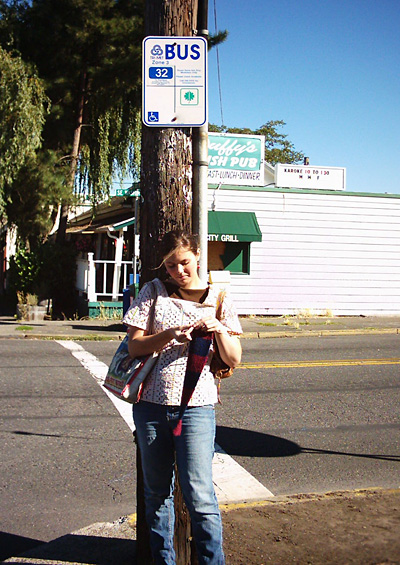Refreshing
lessons from subway knitting
  I’m not from New York. In the
two years I lived there, it often felt that
no one was, that everyone there had come from
somewhere else, and that everyone there would
eventually go somewhere else, either back home
or to the next urban thrill. It was a
transitory city, and its streets were clogged,
and the only way to get anywhere was by public
transit. I’m not from New York. In the
two years I lived there, it often felt that
no one was, that everyone there had come from
somewhere else, and that everyone there would
eventually go somewhere else, either back home
or to the next urban thrill. It was a
transitory city, and its streets were clogged,
and the only way to get anywhere was by public
transit.
My second year there,
dismayed at rising rents, I moved farther
away from school, and my transit time increased.
I must have averaged at least two hours a
day on the subway, spending an eighth of
my waking hours not in the city, but under
it.
Large companies tend
to buy an entire left or right side of a
subway car and run similar ads in all available
space. I often found
myself sitting across from a side bought out
by an airline, my eyes fixed stop upon stop
on enticing photos of far-away places, imagining
myself in Accra, in Berlin, in Kiev, imagining
myself lying comfortably in my bed, imagining
myself at my final destination, imagining myself somewhere,
anywhere other than the passing stage of the
subway. The nowhere of the subway.
I almost never took
the subway with friends, riding it instead
on my way to meet friends, or of course on
the obligatory morning and evening commute. Instead,
I would sit or stand tightlipped, alone,
in a car full of equally tightlipped passengers
sitting or standing with me.
It was a stressful
city, and eventually, I attempted knitting
to relieve stress. I
had dabbled in knitting before, but had never
made it past the scarf and baby blanket stage,
and had never justified to myself the use of
any material other than acrylic. This
time, I delved deeply, visiting a tiny but
richly stocked shop in which women and men
sat around tackling ambitious Fair Isle sweaters
and crocheting purses that I would have thought
were impossible to make by hand. Knit
bikinis hung from the walls next to balls of
yarn marked at prices unheard of in my local
warehouse-like craft store. Intimidated,
I finally got the courage to walk up to a salesperson
and ask her for advice on knitting a bikini
of my own; I walked out with yarn, needles,
a pattern book, and considerably less money
in my bank account.
  I was hooked. Knitting during every
spare moment in my apartment, I finished the
bikini within a couple days and, emboldened,
returned to the yarn store to begin tackling
a sleeveless shirt. Encouraged by the
quick gratification of the bikini project,
I was a bit put-off with waiting day after
day for the shirt to take shape in my living
room. That’s when I decided to
take my knitting to the streets – er,
under them. I was hooked. Knitting during every
spare moment in my apartment, I finished the
bikini within a couple days and, emboldened,
returned to the yarn store to begin tackling
a sleeveless shirt. Encouraged by the
quick gratification of the bikini project,
I was a bit put-off with waiting day after
day for the shirt to take shape in my living
room. That’s when I decided to
take my knitting to the streets – er,
under them.
My previous subway
pastimes, reading and staring off into space,
had the distinct advantage of being able
to be pursued while sitting down or standing
up. Knitting while standing,
however, proved too difficult for my level
of coordination. At first, I waited until
the last few stops of my commute, when the
train became less crowded and I could finally
snag a seat, to pull my yarn out of my oversized
purse and begin to have a go at it. Eventually,
I found myself choosing to take slower local
trains; they were less crowded and it was easier
to find a seat on them. What I lost in
speed, I told myself, I made up in enjoyment. And
I began to get so caught up in my knitting
that I found myself, on occasion, wishing that
my stop would be delayed, just so that I could
finish the next row. If I now spent more
time on the train, I spent less time wishing
to be in Accra instead.
After a while, I began
to have subway knitting down to a science. I stuck to projects
that would require only one color of yarn,
not wanting to bring multiple balls on the
train. I chose stitch patterns repetitive
enough to memorize – having learned early
on that it was difficult enough to manage my
purse and project at once, and that taking
a pattern out for reference threatened my precarious
balance. I developed a distinct seating
preference, vying for the right end of a row
with my back to the wall, to the point where
I would get up to switch if one of these seats
became available. I relished in the extra
room on my right side, my elbow free to jut
out and bob up and down as it pleased, without
putting other passengers in mortal danger. If
I was lucky enough to have a little wiggle
room in my row, I would wedge my knitting bag
between my body and the divider next to me,
safe and snug and unlikely to fall down with
my yarn tumbling out of it.
There were snags, however. Sometimes
my yarn did fall out of the bag, in which case
a stranger would usually be so kind as to bend
down and pick it up for me. I would thank
him, and smile sheepishly, and go back to my
work. But my interactions with strangers
didn’t stop there. Before beginning
my stint as a subway knitter, the longest sentence
any passenger had addressed to me was the occasional “Excuse
me,” excluding, of course, less polite
turns of phrase. With yarn and needles
in my lap, the passengers around me became
more and more garrulous.
“What are you knitting?” being
the obvious question on everyone’s mind,
I reveled in defying expectations. Sure,
there was the sweater for my little brother
for Christmas. But there was also the
tank top, and the nightgown, and other fare
that promised to either stilt or spark conversations,
depending on the dispositions of those around
me. Some people know exactly what to
say to the girl knitting a lacy nightgown on
the subway. Others just don’t.
Men, above all, wanted
to chat about knitting. Ignoring
both my boyfriend’s and my stepdad’s
warnings that, well, these men had other subjects
on their mind, I still firmly believe that
they were attracted to the craft, not by me. There’s
something mesmerizing in watching lank and
shapeless string slowly and rhythmically take
form, one loop at a time. I imagined
a city full of latent male knitters, unaware
of their passion for the art until they saw
it done before their eyes. In our conversations,
I tried to emphasize the fact that they, too,
could knit if they wanted to. No one
seemed interested, but who knows? Maybe
I planted a seed…
Then there were the
cheerleaders. Like
the man who sat next to me as I pulled out
my fuzzy pink yarn and sleek bamboo needles,
attempting no more than an innocent purl-two,
knit-one rib. He turned to me, shook
his head, and exclaimed, “That’s
awesome.” There was also the woman
who admired one of my more intricate projects
and told me, simply, that it was beautiful.
I don’t want to say that New York got
me down at times, because cities get everyone
down at times, and I would be completely ignoring
the times it got me up, because the excitement
and the light and the footsteps and the car
horns and the height, the sheer and brazen
height of it all, did a lot to get one up. To
state it in other words, I was becoming frighteningly
used to the silence of strangers who, when
speaking, so often came up with abruptness,
derision, or a protective dose of irony. To
have a stranger sit next to you and tell you
that what you’re doing is beautiful,
completely devoid of sarcasm in her voice – well,
that’s beautiful.
During my entire anonymous
subway existence, I had been secretly and
silently dying to talk to strangers, and
it turned out that I was not alone. Although knitting needles
occasionally constitute weapons in airports,
on the train, they disarm. They instantly
made me more approachable and other passengers
less creepy for approaching me. It turned
out that knitting did, indeed, reduce stress.
Pleased and comfortable
with my status as a subway knitter, I worked
on the finishing touches of the nightgown
I had been knitting for several months and
innumerable stations. A
woman sat down across from me, pulled out a
large ball of pastel rainbow yarn and a purple
plastic crochet hook, and began to do her stuff. She
created, out of nowhere, a square the size
of a CD case, and then began to make another. I
smiled as I knit, looking at her work, reveling
in our shared craft: we were those who made
beautiful things out of yarn on the train. I
got up at my stop and approached her on the
way out. “That’s great,” I
said, and smiled. “That’s great,” she
replied. A sentence no longer than “Excuse
me,” but much more refreshing.
|

